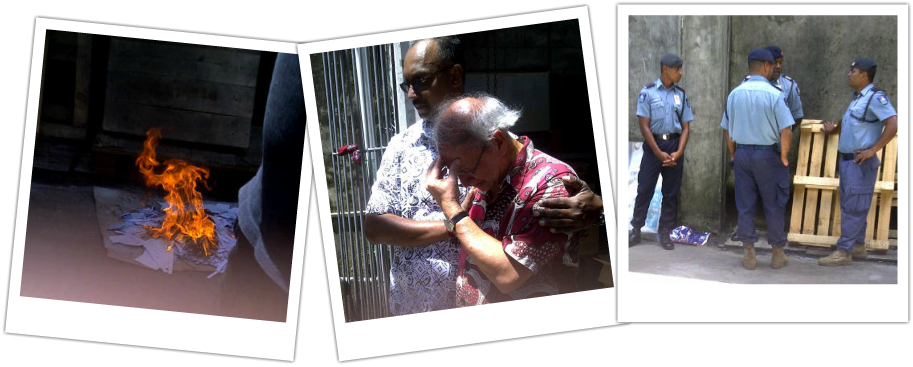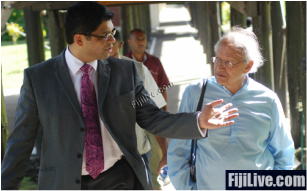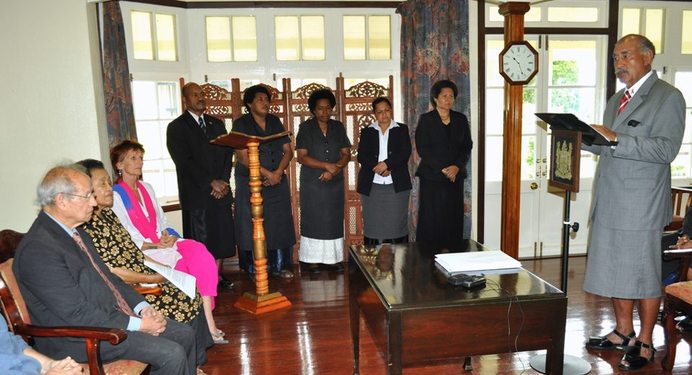"The provision to change the Constitution was the brainchild of the very people who run Government now. The AG is in a position to ensure that Parliament approves a referendum but will not do so. Instead he uses the excuse that the Constitution will not allow a referendum. He conveniently forgot to tell the UN that it was his regime that imposed such harsh conditions that it is almost impossible to change the Constitution without his concurrence. All for the sake of protecting those responsible for the coups and the atrocities that followed over many years and many of it criminal in nature. These atrocities include denial of basic human rights guaranteed under the UN Charter."
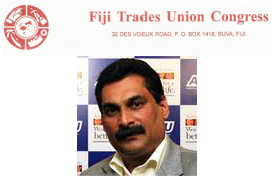
Fiji Misleads UN Yet Again
During the last Hearing of the United Nations Human Rights Council, one recommendation was that Fiji establishes a Constitutional Commission to conduct a comprehensive review of the 2013 Constitution and carry out a national consultation to ensure that the Constitution is reflective of the will of the people. The Attorney General responded and advised the Council that the Constitution that came into force on 7th September 2013 “is the expression of the will of the people” and therefore any amendment of the Constitution would only be conducted through the process stipulated under the Constitution whereby Parliamentary approval must be sought for a referendum.
The FTUC disputes this assertion as thoroughly misleading and borders on a lie. The expression of the will of the people was captured by the Yash Ghai draft after more than 7000 submissions by people and organizations from around the country. This Government thrashed that draft Constitution and imposed the current Constitution on the people of Fiji. This fact is on record and no amount of government propaganda will change this. The FTUC calls on Government to demonstrate sincerity and honesty and not mislead the international community as this only brings disrepute to Fiji. This has become common knowledge and a serious problem which is also recognized at the ILO.
The provision to change the Constitution was the brainchild of the very people who run Government now. The AG is in a position to ensure that Parliament approves a referendum but will not do so. Instead he uses the excuse that the Constitution will not allow a referendum. He conveniently forgot to tell the UN that it was his regime that imposed such harsh conditions that it is almost impossible to change the Constitution without his concurrence. All for the sake of protecting those responsible for the coups and the atrocities that followed over many years and many of it criminal in nature. These atrocities include denial of basic human rights guaranteed under the UN Charter.
It is time that this Government is put under scrutiny whenever they make any pronouncements abroad. The FTUC also calls upon the media to be vigilant and seriously carry out its responsibility to ensure accountability and take to task anyone or Government and not just critics of Government. Sadly we do not see that today and partly so because we continue to live in a dictatorship and restrictions remain, despite elections and so called democracy.
The FTUC calls upon the AG and his Government to call a referendum on the Constitution. If the AG truly believes that the Constitution is an “expression of the will of the people”, he should have no hesitation in conducting a referendum.
Similarly, the AG has advised the UN that Government MOU on the future of labour relations reflects the intentions of the social partners. He again conveniently forgot to tell the UN that the social partners disagree and its MOU does not address the real issues in regards to the denial of workers’ rights and the continued effect of the decrees he imposed that violate International Conventions.
Felix Anthony
National Secretary
'The UN High Commissioner for Human Rights has demonstrated his naivety when commenting on Fiji as an example to the world. Clearly this “High Commissioner” is not aware about Fiji other than what he has heard from the Prime Minister. He has not researched what the people of Fiji have gone through over the past few years since this Prime Minister carried out a military coup.':
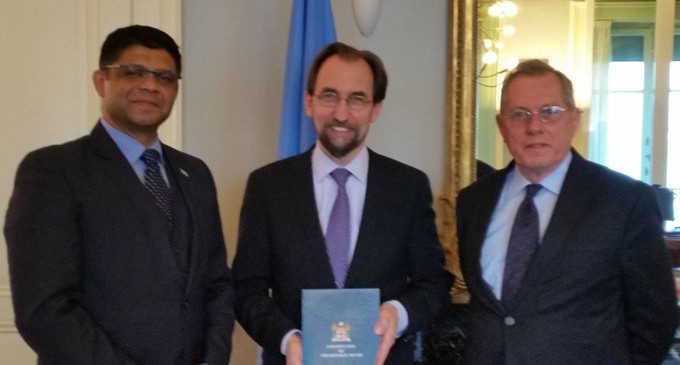
Friday, 20/03/2015; Source: Fijivillage News
The United Nations Human Rights Council has adopted the outcome of the Universal Periodic Review of Fiji after presentations by Attorney General Aiyaz Sayed-Khaiyum in Geneva.
Sayed-Khaiyum thanked the states for their recommendations and their acknowledgment of progress made.
However he said it was unfortunate that some of the comments made by non‑governmental organizations were based on hearsay by third‑party sources and not facts, which would be more constructive.
Regarding the Essential National Industries Decree, he noted that stakeholders had been consulted during a meeting of employer and employee representatives who would be directly affected by the decree.
According to the press statement by the council, there was consensus that the law had to be improved and that would be done following legislative procedures.
On the issues pertaining to the freedom of expression, Sayed-Khaiyum confirms that if any law is contrary to the constitution, the constitution would prevail.
Out of 138 recommendations received, 112 enjoyed the support of Fiji and 26 were noted.
Sayed-Khaiyum reiterated Fiji’s commitment to advancing and protecting the fundamental principles and values of universal human rights.
He said the constitution of Fiji enshrined fundamental principles and values such as common and equal citizenry, a secular state and good governance.
Sayed-Khaiyum said for the first time a comprehensive and very progressive Bill of Rights has been created which allows for the realization of socio‑economic rights as well as civil and political rights.
He said it has also established a Human Rights and Anti‑Discrimination Commission for the promotion, protection, observance of and respect for human rights guaranteed under the constitution.
China welcomed Fiji’s commitment to international cooperation in the field of human rights and the large number of recommendations it had accepted.
India welcomed Fiji’s commitment to the Universal Periodic Review process, and noted with appreciation that the new constitution of Fiji contained dispositions on all human rights and on the elimination of ethnic voting
Indonesia and Kuwait commended Fiji for holding successful elections in 2014 and hoped that the democratization process would further strengthen its constitutional reforms and promote long‑term stability.
New Zealand welcomed the removal of the death penalty from the military penal code.
Sierra Leone noted with satisfaction the acceptance by Fiji of the great number of the recommendations.
Sierra Leone particularly welcomed the efforts to protect women and girls from violence.
The council report says minority Rights Group expressed concern that the Human Rights and Anti‑Discrimination Commission suffered from a lack of adequate resources and called on Fiji to take immediate action to restore its functionality.
Human Rights Watch expressed concern that Fiji did not accept the recommendation to remove the Media Decree.
It also called on Fiji to facilitate a visit by the Special Rapporteur on Torture.
